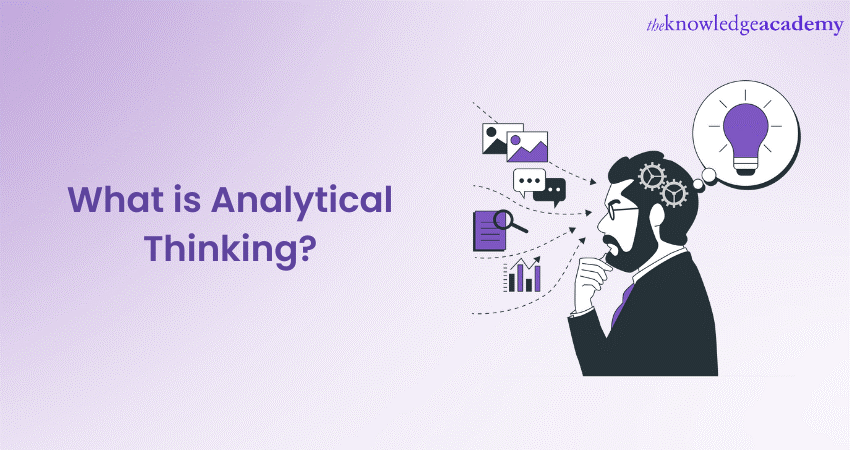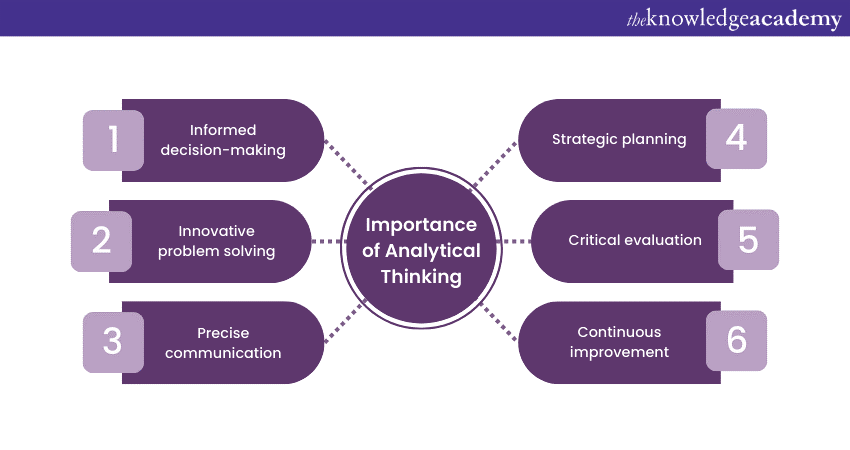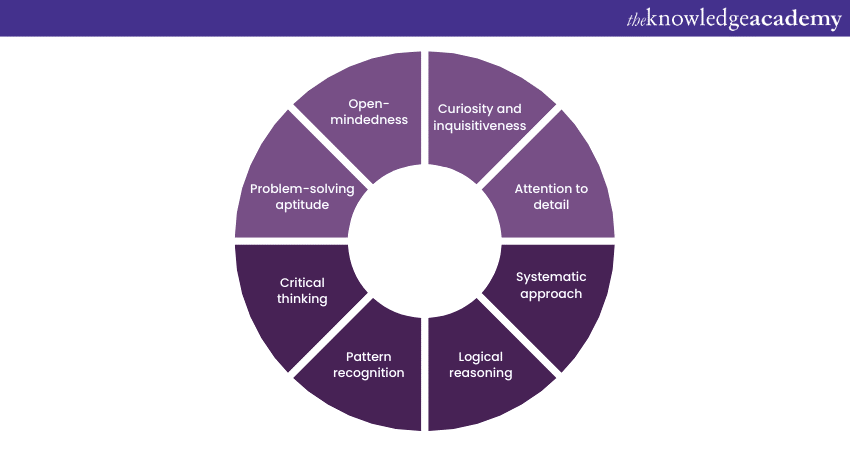We may not have the course you’re looking for. If you enquire or give us a call on 01344203999 and speak to our training experts, we may still be able to help with your training requirements.
Training Outcomes Within Your Budget!
We ensure quality, budget-alignment, and timely delivery by our expert instructors.

In a world brimming with challenges and complexities, the ability to dissect, interpret, and innovate has become a cornerstone of success. This approach to thinking can be termed Analytical Thinking and can be described as a vital skill in modern society. In this blog, we will tell you all you need to know about What is Analytical Thinking, its different characteristics and its significance in the modern world.
Table of Contents
1) What is Analytical Thinking?
2) Why is Analytical Thinking important?
3) Important elements of Analytical Thinking
4) How to master Analytical Thinking?
5) Conclusion
What is Analytical Thinking?
Analytical Thinking is the cognitive process of dissecting intricate problems, data, or situations into smaller components to discern patterns, relationships, and underlying principles. It involves critical observation, logical reasoning, and systematic analysis to arrive at informed conclusions or solutions.
The skill of Analytical Thinking empowers individuals to make well-judged decisions, innovate creatively, and communicate complex ideas. Analytical Thinking is a bedrock of effective problem-solving, enabling individuals to navigate challenges with precision and adaptability, whether in daily life, business, or academic pursuits.

Why is Analytical Thinking important?
After learning about What is Analytical Thinking, let's delve into the multifaceted importance of Analytical Thinking:

Informed decision-making
At its core, Analytical Thinking equips individuals with the tools to dissect intricate scenarios, distil pertinent information, and make informed decisions. From someone pondering a career move, considering a significant investment to someone deciding on a course of action, Analytical Thinking allows you to assess the pros and cons, identify potential pitfalls, and forecast outcomes.
Innovative problem solving
Innovation often springs from the ability to connect disparate dots and unearth hidden solutions. Analytical thinkers possess the capability for dissecting complex problems, breaking them into manageable components, and reassembling them in novel ways. This cognitive dexterity breeds innovation, as it enables individuals to envision alternative paths and approaches that might otherwise remain concealed.
Precise communication
Clear and effective communication is essential in all walks of life. Analytical Thinking fosters the capacity to organise thoughts logically, structure arguments coherently, and present ideas with precision. Regardless of whether you're explaining a concept to a colleague, delivering a persuasive pitch, or writing a research paper, the analytical thinker's ability to present complex ideas succinctly and comprehensibly is an invaluable asset.
Strategic planning
From business strategies to personal goals, strategic planning hinges on the ability to anticipate outcomes, devise contingencies, and adapt to changing circumstances. Analytical Thinking lends itself to strategic prowess by enabling individuals to assess multiple variables, foresee potential roadblocks, and chart a course that maximises the likelihood of success.
Critical evaluation
In a world rife with misinformation and biased narratives, the skill of critical evaluation is more crucial than ever. Analytical Thinking empowers individuals to sift through a barrage of information, discern credible sources, and separate fact from fiction. This aptitude for discernment is a bulwark against being swayed by superficial allure or baseless assertions.
Continuous improvement
Analytical thinkers possess an innate curiosity that propels them towards constant learning and growth. They see challenges not as insurmountable obstacles but as opportunities for enhancement. This drive for self-improvement extends beyond their capabilities; analytical thinkers often seek to refine processes, systems, and products, contributing to advancing their fields and industries.
Unlock your creative potential and enhance your Analytical Thinking skills with our comprehensive Creative and Analytical Thinking Training!
Important Elements of Analytical Thinking
Now that you know the meaning of Analytical Thinking, let's explore its characteristics. Analytical Thinking is more than a mere mental exercise; it's a unique cognitive approach that involves a specific set of traits and habits. Those with these characteristics are adept at dissecting complexities, drawing insights from data, and arriving at well-reasoned conclusions. Here are the key attributes that define Analytical thinkers:

Curiosity and inquisitiveness
Analytical Thinkers exhibit a natural curiosity about the world around them. They possess an insatiable desire to understand how things work and why they are the way they are. This curiosity fuels their exploration of concepts, data, and problems, leading them to uncover hidden connections and unexpected insights.
Attention to detail
One of the hallmarks of Analytical Thinking is an unwavering attention to detail. Analytical individuals have a knack for spotting even the minutest discrepancies, anomalies, or patterns within data or scenarios that might go unnoticed by others. This acute attention to detail is instrumental in identifying potential issues and crafting precise solutions.
Systematic approach
Analytical Thinkers approach problems methodically. They break down complex issues into manageable parts, which allows them to analyse each component individually before synthesising a comprehensive understanding. This systematic approach enables them to unravel intricate challenges and address them step by logically.
Logical reasoning
Logical reasoning is the bedrock of Analytical Thinking. Those who possess this trait are skilled at constructing and deconstructing arguments, identifying flaws in reasoning, and evaluating the validity of information. This ability helps them sift through the noise and reach well-founded conclusions based on evidence and logic.
Pattern recognition
Analytical Thinkers excel at recognising patterns and trends across various data sets or scenarios. They have an innate ability to identify similarities and differences, allowing them to generalise principles from specific instances and apply them to broader contexts.
Critical thinking
Critical thinking is a cornerstone of Analytical Thinking. Individuals with this characteristic are not content with accepting information at face value; they question assumptions, challenge norms, and seek underlying reasons. This intellectual rigour ensures that their conclusions are well-substantiated and comprehensive.
Problem-solving aptitude
Analytical Thinkers thrive on solving complex problems. They approach challenges with a blend of creativity and logic, devising innovative solutions that address the root causes rather than merely treating symptoms. Their ability to dissect problems and explore multiple angles empowers them to tackle even the most daunting issues.
Open-mindedness
While Analytical Thinkers possess strong reasoning skills, they also embrace open-mindedness. They acknowledge that not all problems have linear solutions and are willing to explore unconventional ideas and viewpoints. This adaptability allows them to adapt their approach when encountering new and unexpected scenarios.
Unlock your potential with our Decision-Making Skills Training - empower your choices and lead with confidence!
How to master Analytical Thinking?
In order to master your Analytical Thinking skills, you can adapt the following skills:
1) Analysing information involves thoroughly examining data or a situation to identify crucial elements, assess their strengths and weaknesses, and leverage this understanding to construct a compelling argument, offer recommendations, or address a problem effectively.
2) Breaking down problems simplifies significant challenges by dividing them into more minor, manageable issues that are easier to solve individually.
3) Gathering information requires asking pertinent questions of oneself and others to gain valuable insights, facilitating more informed decision-making when tackling problems.
4) Identifying issues and problems involves honing the skill of recognising underlying issues or challenges through analysing trends, associations, and cause-effect relationships within datasets.
5) Identifying the root cause is conducting a thorough analysis to pinpoint the fundamental cause of a problem, ensuring that efforts are focused on addressing the actual issue rather than just its symptoms.
6) Organising information entails systematically arranging and integrating all collected data to derive insights and generate ideas, laying the groundwork for potential solutions to the problems at hand.
Conclusion
Analytical Thinking emerges as an invaluable beacon in a world demanding ever-greater insight and adaptability. Its ability to unravel complexity, innovate solutions, and foster critical evaluation empowers individuals across diverse domains. By cultivating a curious mind, attention to detail and logic, we can get started on a journey of continuous improvement. Hope we could answer all your queries about “What is Analytical Thinking”!
Unlock your leadership potential with our comprehensive Leadership Training - Join now for a transformative learning journey!
Frequently Asked Questions

Here's how you can enhance Analytical Thinking skills:
a) Practice regularly: Solve puzzles and engage in analytical games.
b) Read widely: Explore diverse topics for a broader perspective.
c) Critical reflection: Reflect on experiences and decisions critically.
d) Ask questions: Challenge information and seek underlying reasons.
e) Break down issues: Analyse complex problems by breaking them into parts.
f) Seek feedback: Discuss analyses with peers for valuable insights.
g) Learn from mistakes: Analyse failures for continuous improvement.
h) Data literacy: Understand and interpret data for informed decisions.
i) Stay curious: Cultivate curiosity to explore various problem angles.
j) Take on projects: Apply analytical skills in practical scenarios for hands-on experience.

Analytical Thinking is vital for career growth, enabling strategic decision-making and effective problem-solving. It empowers professionals to navigate challenges, make informed decisions, and drive innovation. Those skilled in Analytical Thinking excel in strategic planning, problem-solving, and efficient decision-making. They contribute to organisational success by optimising operations, fostering innovation, and exhibiting leadership qualities. This skill enhances adaptability in dynamic environments, encourages continuous learning, and improves communication with diverse stakeholders.

Individuals with strong analytical skills can create detailed plans, identify critical milestones, and allocate resources efficiently by breaking down complex projects into manageable components. This approach allows setting of precise timelines and realistic goal-setting. Analytical thinkers excel at anticipating potential challenges, enabling proactive problem-solving and risk mitigation. They prioritise tasks based on strategic importance and resource availability, ensuring optimal time utilisation. Additionally, Analytical Thinking aids in assessing project progress through data analysis, facilitating informed adjustments when necessary.

The Knowledge Academy takes global learning to new heights, offering over 30,000 online courses across 490+ locations in 220 countries. This expansive reach ensures accessibility and convenience for learners worldwide.
Alongside our diverse Online Course Catalogue, encompassing 17 major categories, we go the extra mile by providing a plethora of free educational Online Resources like News updates, blogs, videos, webinars, and interview questions. Tailoring learning experiences further, professionals can maximise value with customisable Course Bundles of TKA.
The Knowledge Academy’s Knowledge Pass, a prepaid voucher, adds another layer of flexibility, allowing course bookings over a 12-month period. Join us on a journey where education knows no bounds.

The Knowledge Academy offers various Leadership Courses, including Leadership Skills, Creative Leader Thinking and Creative and Analytical Thinking. These courses cater to different skill levels, providing comprehensive insights into Leadership Qualities
Our Leadership Training blogs covers a range of topics related to leadership and analytical thinking, offering valuable resources, best practices, and industry insights. Whether you are a beginner or looking to advance your Leadership skills, The Knowledge Academy's diverse courses and informative blogs have you covered.
Upcoming Business Skills Resources Batches & Dates
Date
 Successful People Management and Team Leadership
Successful People Management and Team Leadership
Fri 7th Jun 2024
Fri 2nd Aug 2024
Fri 4th Oct 2024
Fri 6th Dec 2024







 Top Rated Course
Top Rated Course


 If you wish to make any changes to your course, please
If you wish to make any changes to your course, please


